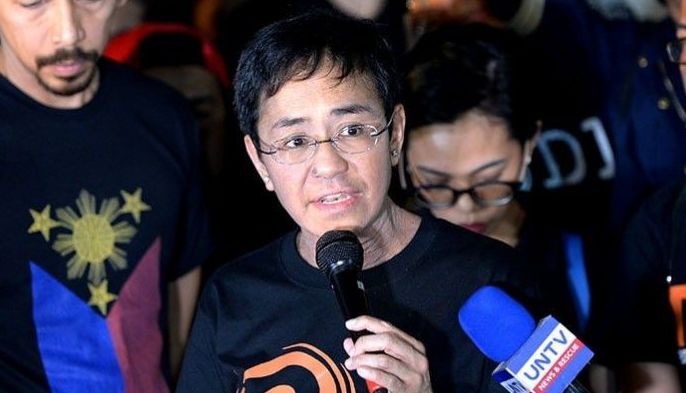Court convicts Rappler's Ressa on cyber libel

MANILA, Philippines (Update 2: 10:42 a.m.) — Rappler chief executive Maria Ressa, whose media company has long been at the end of President Rodrigo Duterte’s attacks, and a former researcher were found guilty on cyber libel by a Manila court on Monday.
Judge Rainelda Estacio-Montesa of the Manila Regional Trial Court Branch 46 convicted Ressa and Rappler’s former researcher Reynaldo Santos Jr. guilty of violating Section 4(c)(4) of the Cybercrime Prevention Act of 2012, or cyber libel.
The court sentenced Ressa and Santos to the indeterminate penalty of imprisonment ranging from six months and one day of prision correccional as minimum to six years of prision correccional as maximum.
Ressa and Santos were allowed to file for post-conviction bail and they would do so, Rappler reported.
They are also ordered to pay private complainant Wilfredo Keng to pay jointly P200,000 for moral damages and P200,000 for exemplary damages.
The case was seen as a test case for the cyber libel provision of the Republic Act 10175 or the Cybercrime Prevention Act of 2012. The case stemmed from a complaint filed by businessman Keng assailing an article that the online news site first published in May 2012 or four months before the cybercrime law was instituted, saying Rappler failed to get his side of the story.
Rappler countered the cybercrime law cannot retroactively be applied to the article, which the media entity said was merely edited for a typographical error in 2014.
"The verdict against Maria Ressa highlights the ability of the Philippines’ abusive leader to manipulate the laws to go after critical, well-respected media voices whatever the ultimate cost to the country," Human Rights Watch Deputy Asia Director Phil Robertson said.
"The Rappler case will reverberate not just in the Philippines, but in many countries that long considered the country a robust environment for media freedom."
READ: Lawyers: Press freedom threatened by sedition, cyberlibel laws
Ressa and Santos’ liability
The article central to the case is a May 2012 story and was updated on February 2014. DOJ prosecutors said this counted as multiple publication, and the court held that this update—Rappler said it was just to correct the “evation” to “evasion”—a “republication.”
With an updated story published on the site, the May 2012 article “can no longer be found” and “only the 19 February 2014 version presently exists.”
Rappler’s defense that the update was merely a correction of a typographical error was also deemed by court as merely hearsay.
The court noted Keng’s defense that they repeatedly sought Rappler to publish their side, but the news site did not. “A news organization who claims to adhere to accuracy, fairness and balance in terms of reporting, would have retracted, or at the very least issued a clarificatory article if there have been some indications of falsity to its previous article... This clearly shows actual malice,” the decision read.
Ressa said that as an executive editor, she does not edit stories that the news site publishes, including the assailed article. But the court called Rappler’s non-usage of the term “editor-in-chief” is a “scheme... a clever ruse to avoid the liability of the officers of a news organization who can be held responsible for libel under Article 360 of the Revised Penal Code,” in relation to the Cybercrime Prevention Act.
The court, however, ruled that Rappler Inc had no liability in the case, as the prosecution also did not adduce evidence against the company.
Court insists: Press is free
“[T]he court is mandated to decide solely on the basis of the evidence presented by the parties and to apply the law. No more, no less,” the judge also said.
“The Courts are tasked to strike a balance between the enforcement of one’s right to speak his mind and the protection of another’s right against defamation of his honor and reputation without regard to the stature of the personalities involved,” the ruling read.
The court also said that if ordinary users of the internet can be held accountable for defamatory posts, so too journalists. But it stressed: “There is no curtailment of the right to freedom of speech and of the press.”
“The right to free speech and freedom of the press cannot and should not be used as a shield against accountability,” it added.
Duterte and Rappler
The cyber libel case is just one of many legal suits that have piled up against Rappler since the Duterte administration took office in July 2016, allegations of impropriety that the media company has repeatedly denied.
The media company faced a closure order from the Securities and Exchange Commission in 2018 over its use of Philippine Depositary Receipts, which allegedly allowed foreign ownership in the media company. This case was elevated to the Court of Appeals, which later remanded it to the regulatory body after investor Omidyar Network donated its PDRs to Rappler staff.
By law, Rappler was allowed to operate pending the decision of the courts.
In 2018, Rappler was also indicted for tax evasion by the justice department, a case the company is now facing before the Court of Tax Appeals. The media firm was also charged with supposed violations of the Securities and Regulations Code.
Similar with its stance on government charges against ABS-CBN Corp. and Philippine Daily Inquirer, Malacañang has maintained that the Palace had nothing to do with the cases against Rappler and Ressa.
It has also denied that Rappler's legal issues have anything to do with press freedom despite statements and warnings from journalists' and civil society groups that the cases are an attempt to silence critical reporting of the Duterte administration.
Cyber libel laws
Philippine journalists have long called for decriminalization of libel, and decried the inclusion of a libel provision in Republic Act 10175 or the Cybercrime Prevention Act of 2012. For one, the Philippine Center for Investigative Journalism, in 2014, warned of the “chilling effect” on free expression of the cyber libel provision of the law.
Media watchdog Center for Media Freedom and Responsibility, which monitors libel cases against Filipino journalists, said cyber libel is “one of the most problematic provisions” of the Cybercrime Prevention Act. It warned that the law “throws such a wide net it penalizes even legitimate expressions of opinion online.”
Last Thursday, UN Special Rapporteur on the Right to Freedom of Opinion and Expression David Kaye warned that the application of the Cybercrime Prevention Act of 2012 "to individuals years after the posting of an article, under the guise of online continuous publication, raise particular concerns under the right to freedom of expression."
"Such application may significantly chill freedom of expression by not clearly delineating to either authorities or online writers when a violation of the law has occurred," he said in an amici curiae (friend of the court) brief.
Despite calls from journalists' groups, media workers, lawyers and press freedom advocates to stand behind media outfits under attack, mainstream media has largely shied way from the press freedom implications of cases against the Rappler and against network giant ABS-CBN, whose franchise the House of Representatives allowed to lapse.
Hearings at the Senate and the House have touched on the network's alleged offenses against the president.
RELATED: Foreign journos' mission finds 'increasing levels of intimidation' vs local press
Palace answers questions on barring of Rappler reporter Pia Ranada from entering Malacañan New Executive Building to cover. It was later clarified that Ranada is allowed to enter the New Executive Building but not Malacañan, where the president's events are held.
Philippine Nobel laureate Maria Ressa was acquitted Tuesday of her final tax evasion charge, in the latest legal victory for the veteran journalist as she battles to stay out of prison.
Ressa, 59, smiled as the judge delivered the verdict in the years-long case, an AFP journalist inside the court room said.
Philippine Nobel Prize winner Maria Ressa and her online media company Rappler were on Wednesday acquitted of all four charges of tax evasion filed against her, a court says.
Ressa, who won the Nobel along with Russian journalist Dmitry Muratov in 2021, still faces three other criminal cases, including a cyber libel conviction now under appeal that could mean nearly seven years in prison.
"Today, facts win. Truth wins," a defiant Ressa told reporters outside the Manila courtroom shortly after the court ruled on government charges that she and Rappler dodged taxes in a 2015 bond sale to foreign investors.
"These charges were politically motivated," Ressa said Wednesday. "We were able to prove that Rappler is not a tax evader." — AFP
The Court of Appeals has stood firm in its ruling that earlier denied the appeal of Rappler CEO Maria Ressa and former researcher Reynaldo Santos Jr. to overturn a Manila court’s conviction of cyber libel against them.
“Wherefore, the motion for reconsideration is denied,” the CA’s Fourth Division says in a ruling promulgated October 10.
Ressa and Santos sought for the reconsideration of the same CA court decision dated July 7, 2022 that affirmed the Manila Regional Trial Court Branch 46’s ruling that found them guilty beyond reasonable doubt for the crime of cyber libel.
State-run Philippine News Agency reports that the Court of Appeals has junked the appeal of Rappler CEO Maria Ressa and its former researcher Reynaldo Santos to overturn the cyber libel conviction rendered by a Manila court in June 2020.
Independent news site Bulatlat.com condemns the SEC ruling that upheld its 2018 decision to shutdown of news company Rappler Inc.
In a statement, it says: "It is alarming how laws are weaponized to muzzle independent media. Administrative orders and other regulatory powers of government, such as franchise in the case of ABS-CBN, should not be used to trample upon press freedom and free expression."
Bulatlat, whose website has been blocked by the NTC following NSA Esperon's request, calls on fellow journalists "to resist the attacks, and unite in defending and upholding press freedom and the public's right to know."
Below is Bulatlat's statement condemning the SEC shutdown order vs. Rappler. pic.twitter.com/gJhuerHhfp
— Bulatlat (@bulatlat) June 29, 2022
- Latest
- Trending



































